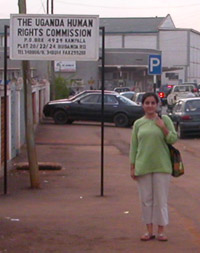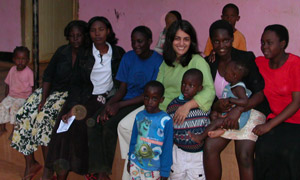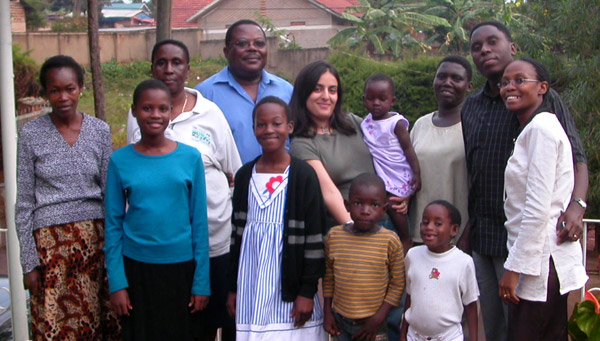Associates for Change/Human Rights Commission (Uganda)
 This summer I was posted as an intern in the Legal and Tribunal Division of the Uganda Human Rights Commission in Kampala, Uganda. Within this division, I was assigned to do research and write legal opinions on cases involving allegations of torture in police custody, as well as some land expropriation and maintenance cases. At any given time I was carrying a caseload of 10-15 files, and it was my responsibility, wherever possible, to meet with the parties in each case if they had any questions prior to their hearing. My research was also compiled by myself into a reference document which is now in use at the Commission's own library.
This summer I was posted as an intern in the Legal and Tribunal Division of the Uganda Human Rights Commission in Kampala, Uganda. Within this division, I was assigned to do research and write legal opinions on cases involving allegations of torture in police custody, as well as some land expropriation and maintenance cases. At any given time I was carrying a caseload of 10-15 files, and it was my responsibility, wherever possible, to meet with the parties in each case if they had any questions prior to their hearing. My research was also compiled by myself into a reference document which is now in use at the Commission's own library.
Any plaintiffs who brought a case to the UHRC were first sent to the Complaints and Investigations Department, where they would formally file their complaint and make a statement. The department would then contact all parties involved and gather any available evidence. At this stage, the file would be sent to myself or any other law student in the LT division and we would analyze the case. If there were loopholes or inconsistencies, then the file would be sent back for further investigation. Otherwise, we would begin research on case law relevant to that particular matter. The Commission's primary use for me was that I provided them with access to foreign libraries and research tools. In this matter, the library staff and particularly Ted Tjaden were very helpful and provided their full services. As a result, the Commission, in its decisions, began citing international documents and decisions from foreign jurisdictions rather than simply their own case law (most of which had been decided by the same Tribunal and the same Commissioners).
Functionally, the Commission works as a court, but one in which matters are internally investigated. There are seven State appointed Commissioners who sit on the Tribunals and hear each case. Their decisions generally award large monetary damages to plaintiffs whose basic human rights have been violated. Unfortunately, these decisions are subject to appeal and are systematically overturned in higher courts. This, of course, is what any functional judicial system should allow for, however it is a problematic approach in a country where all of the highest courts are plagued by corruption. The Commission itself, in my experience, functioned according to the rule of law, with integrity and justice as its ultimate goal. The higher courts were not nearly as reliable on this count.
 Generally, my experience was a positive one, although it was often very difficult to engage in any form of debate with my colleagues. The cultural divide between us, both legally and socially, was almost impossible to overcome. This was particularly true when one was discussing sensitive social matters, such as the human rights of women or homosexuals. These types of clashes were to be expected, however I did not expect the extent to which they would interfere with my work. Furthermore, the very nature of what I was doing and the injuries and violations committed against the clients with whom I worked caused a great deal of emotional stress throughout the summer. Some of these individuals had been grotesquely mutilated and suffered horrific attacks on their homes and families. I have worked with victims of violence for seven years, and particularly victims of brutal domestic violence. I have training in this area and am an experienced counselor. That said, I had no preparation for this experience and there were several points over the summer where I would have appreciated more support, or at least an established resource to turn to. This was not a matter for the Student Exchange Office, I was not homesick, I was counseling torture victims while dealing with my own related stress and anxiety. Also, I was not entirely sure how to approach many of the clients I worked with, and could have used some advice.
Generally, my experience was a positive one, although it was often very difficult to engage in any form of debate with my colleagues. The cultural divide between us, both legally and socially, was almost impossible to overcome. This was particularly true when one was discussing sensitive social matters, such as the human rights of women or homosexuals. These types of clashes were to be expected, however I did not expect the extent to which they would interfere with my work. Furthermore, the very nature of what I was doing and the injuries and violations committed against the clients with whom I worked caused a great deal of emotional stress throughout the summer. Some of these individuals had been grotesquely mutilated and suffered horrific attacks on their homes and families. I have worked with victims of violence for seven years, and particularly victims of brutal domestic violence. I have training in this area and am an experienced counselor. That said, I had no preparation for this experience and there were several points over the summer where I would have appreciated more support, or at least an established resource to turn to. This was not a matter for the Student Exchange Office, I was not homesick, I was counseling torture victims while dealing with my own related stress and anxiety. Also, I was not entirely sure how to approach many of the clients I worked with, and could have used some advice.
There were many times where I wondered whether someone who did not have my training or background would have been able to handle any of the work at all, and it was unfortunate to think that other law students would miss out on this educational experience for lack of resources. Also, when speaking to many of my fellow IHRP interns I realized that more often than not students had arrived in organizations which were unprepared to receive them and had no substantive work for them to do. I am aware that this is a standard experience for most individuals working in this field at one point or another, but I felt that much of this could have been avoided if there was more continuity in the placement of students from one year to the next. This is not to say that there should be a PBSC-style 'matching' system, but there should at the very least be detailed briefs available to future students so that organizations that provided a particularly rewarding experience can be revisited.
That being said, I was very grateful for the opportunity which I was afforded this summer to visit Uganda and work in such a dynamic organization. After my first year of law school, it was extremely rewarding to be able to travel half-way around the world and see how the practical application of my education could make such a positive impact on the lives of individuals with nowhere else to turn. I would gladly speak to any students in the future who are thinking of working at the Commission and want to prepare a work plan in advance.


 This summer I was posted as an intern in the Legal and Tribunal Division of the Uganda Human Rights Commission in Kampala, Uganda. Within this division, I was assigned to do research and write legal opinions on cases involving allegations of torture in police custody, as well as some land expropriation and maintenance cases. At any given time I was carrying a caseload of 10-15 files, and it was my responsibility, wherever possible, to meet with the parties in each case if they had any questions prior to their hearing. My research was also compiled by myself into a reference document which is now in use at the Commission's own library.
This summer I was posted as an intern in the Legal and Tribunal Division of the Uganda Human Rights Commission in Kampala, Uganda. Within this division, I was assigned to do research and write legal opinions on cases involving allegations of torture in police custody, as well as some land expropriation and maintenance cases. At any given time I was carrying a caseload of 10-15 files, and it was my responsibility, wherever possible, to meet with the parties in each case if they had any questions prior to their hearing. My research was also compiled by myself into a reference document which is now in use at the Commission's own library. Generally, my experience was a positive one, although it was often very difficult to engage in any form of debate with my colleagues. The cultural divide between us, both legally and socially, was almost impossible to overcome. This was particularly true when one was discussing sensitive social matters, such as the human rights of women or homosexuals. These types of clashes were to be expected, however I did not expect the extent to which they would interfere with my work. Furthermore, the very nature of what I was doing and the injuries and violations committed against the clients with whom I worked caused a great deal of emotional stress throughout the summer. Some of these individuals had been grotesquely mutilated and suffered horrific attacks on their homes and families. I have worked with victims of violence for seven years, and particularly victims of brutal domestic violence. I have training in this area and am an experienced counselor. That said, I had no preparation for this experience and there were several points over the summer where I would have appreciated more support, or at least an established resource to turn to. This was not a matter for the Student Exchange Office, I was not homesick, I was counseling torture victims while dealing with my own related stress and anxiety. Also, I was not entirely sure how to approach many of the clients I worked with, and could have used some advice.
Generally, my experience was a positive one, although it was often very difficult to engage in any form of debate with my colleagues. The cultural divide between us, both legally and socially, was almost impossible to overcome. This was particularly true when one was discussing sensitive social matters, such as the human rights of women or homosexuals. These types of clashes were to be expected, however I did not expect the extent to which they would interfere with my work. Furthermore, the very nature of what I was doing and the injuries and violations committed against the clients with whom I worked caused a great deal of emotional stress throughout the summer. Some of these individuals had been grotesquely mutilated and suffered horrific attacks on their homes and families. I have worked with victims of violence for seven years, and particularly victims of brutal domestic violence. I have training in this area and am an experienced counselor. That said, I had no preparation for this experience and there were several points over the summer where I would have appreciated more support, or at least an established resource to turn to. This was not a matter for the Student Exchange Office, I was not homesick, I was counseling torture victims while dealing with my own related stress and anxiety. Also, I was not entirely sure how to approach many of the clients I worked with, and could have used some advice.